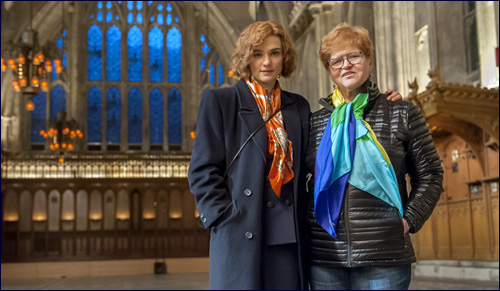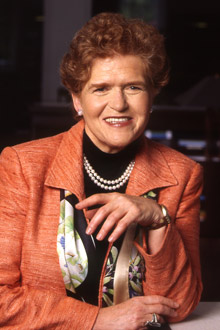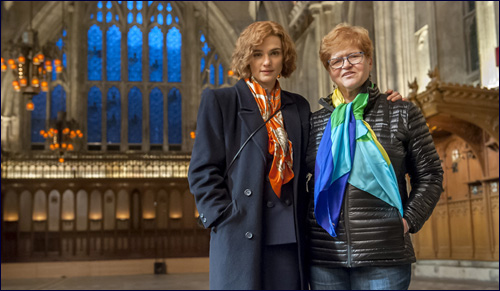 Iran’s Attack on Israel
Iran’s Attack on Israel


5 min read
In a British court, the American professor had to prove David Irving knew he was lying in claiming the Holocaust never happened. An exclusive Aish.com interview.
“I’m not attacking freedom of speech. I’ve been defending my right to stand up against someone who wants to pervert the truth,” declares British actress Rachel Weisz, playing real-life American Holocaust scholar and writer Deborah Lipstadt in the new movie Denial.
The film – based on Lipstadt’s retelling of the David Irving case, History on Trial: My Day in Court with a Holocaust Denier – opens in Israel the first night of Hanukkah. It debuted in the United States in September.
In 1996, David Irving, a British author and historian, sued Lipstadt, Dorot professor of modern Jewish history and Holocaust studies at Emory University in Atlanta, for naming him a Holocaust denier.
Denial carries an eternal message the need to fight for truth.
Lipstadt recalls receiving an express letter from her publisher on a perfect fall day in Atlanta and being incredulous. She learned Irving was drawing her into a fight across the ocean where libel laws were different. “British law placed the burden of proof on me as the defendant. It was a mirror image of American law.”

In other words, in the United States, Irving would have had to prove that Lipstadt lied and slandered him. But in Britain, Lipstadt and her legal team had to prove that Irving knew he was lying in claiming the Holocaust did not occur.
For four years, she prepared for the trial by immersing herself in the works of a man who exuded contempt for her. Lipstadt decided not to take the stand in order to keep the trial focused on Irving himself. For 10 weeks in 2000, she sat 15 feet away from him in a British court as he voiced his sentiments before the judge and world media.
He ultimately lost. Conclusively so.
Denial recounts the drama of Lipstadt’s life during that period. “I feel very gratified that the movie was made. I feel very gratified about the level of the acting and the production value. Mostly I feel gratified because it sends an important message and will make an important contribution to explicating what Holocaust denial is and fighting it, and conquering it,” Lipstadt said from her home in Atlanta before leaving for the Israel premiere of Denial.
Screenwriter David Hare was careful to use actual words from the trial to form the lines Irving speaks in Denial, so that there could be no attack against the film.
Denial is not just a movie for Jewish audiences, Lipstadt emphasizes. It carries an eternal message about truth and the need to fight for truth.
People often comment on her courage to stand up and fight Irving. Lipstadt insists, “I didn’t have an option. The nature of British law compelled me. If I didn’t defend myself, he would have won by default.”
Emory University quietly stood by her, covering travel costs and reducing her teaching load during the trial. As Lipstadt tells it, “They said this is an issue we have to confront. We have to support a professor who’s being sued for supporting her truth.”
 Prof. Lipstadt with actress Rachel Weisz
Prof. Lipstadt with actress Rachel Weisz
Call it courage, but chutzpah has been a steady companion all her life. Growing up in New York, she gained a reputation with the teachers at her Jewish day school as a feisty and combative student. When they did something Lipstadt didn’t consider fair, she would challenge them. Her mother had to appear at the principal’s office more than once to defend Deborah’s actions.
Lipstadt cites her parents and the local rabbi in her childhood home of Far Rockaway, New York, Emanual Rackman, as the most influential teachers in her life. Her father was born in and left Germany before the Third Reich, and her mother was born in Canada. They created a Modern Orthodox home dedicated to Jewish tradition and marked by appreciation for the surrounding secular society.
That cholent shaped Lipstadt’s thinking. When asked what she learned from the David Irving trial, she says, “Our tradition speaks about the need to protect yourself.”
She also saw the necessity to stick to truth. “We don’t have to exaggerate. The deniers are anti-Semites. They want to promulgate lies parading as opinions. Anti-Semites, including those who are not deniers, want to make light of the Holocaust. They want to diminish its importance.”
To beat Holocaust denial, we must know the facts.
Lipstadt also decries false stories circulating about the Holocaust perpetuated by Jews. As she says, the Holocaust was horrific enough that we don’t have to make it worse with false stories – for instance, the idea that Germans mass-produced soap from Jewish remains or the mass suicide of the Jewish young women in the ghetto because the Germans wanted to turn them into sexual slaves. “The Germans were horrific in what they did,” she says. “They tried to wipe out an entire people. It staggers the imagination to think about what they did. We don’t have to add to it by making up things.”
Lipstadt believes that to beat Holocaust denial, we must know the facts. Facts meshed with Holocaust survivors’ memoirs create a powerful anecdote.
With few survivors remaining, she declares, it’s imperative to teach about the Holocaust judiciously so that future generations remember. “We stick to the facts, we talk about it, we have memoirs, we have videos.”
Lipstadt modeled that philosophy in the Denial case. As she wrote, “I became convinced I owed the survivors a full-fledged fight against those who would assault their history.”
